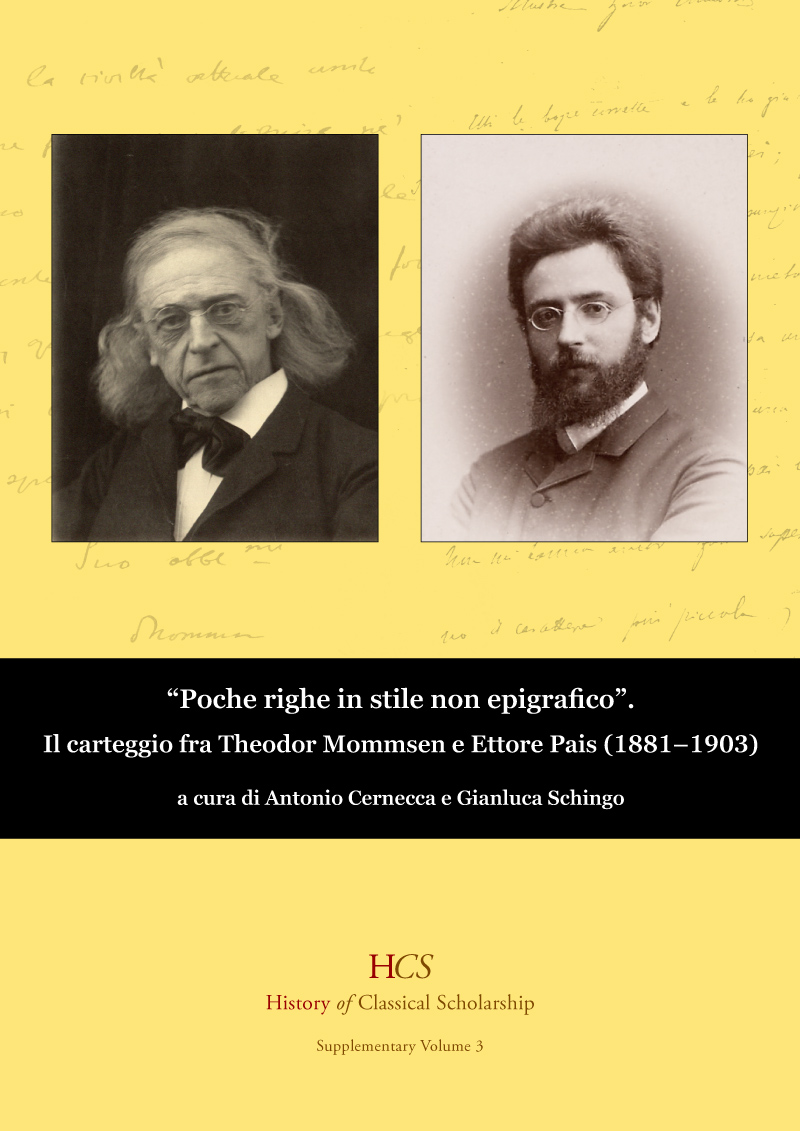“Poche righe in stile non epigrafico”. Il carteggio fra Theodor Mommsen e Ettore Pais (1881–1903)
a cura di Antonio Cernecca e Gianluca Schingo
Keywords:
ISBN 978-1-8380018-2-7, Theodor Mommsen, Ettore Pais, Roman History, Latin Epigraphy, Corpus inscriptionum Latinarum, Supplementa Italica, AltertumswissenschaftAbstract
“Poche righe in stile non epigrafico”. Il carteggio fra Theodor Mommsen e Ettore Pais (1881–1903) a cura di Antonio Cernecca e Gianluca Schingo
Il libro contiene l'edizione integrale della corrispondenza intercorsa fra Theodor Mommsen (1817–1903) ed Ettore Pais (1856–1939). L'epistolario copre un arco di tempo compreso fra il primo soggiorno a Berlino dello studioso italiano nel 1881 e l'anno della morte del grande storico tedesco. Il carteggio è ora disponibile nella sua completezza grazie alla riscoperta delle lettere mommseniane dell'Archivio Pais, che si integrano con le missive paisiane, conservate nel Nachlaß Mommsen della Staatsbibliothek di Berlino. La documentazione epistolare presentata, che parte dai lavori di redazione del supplemento al CIL V per toccare quindi una pluralità di temi diversi, costituisce un'importante fonte di conoscenza dei due studiosi, del loro metodo di lavoro, dei loro rapporti professionali e di amicizia e, nel quadro di fitti riferimenti alla realtà culturale e politica del loro tempo, offre una notevole messe di informazioni suggerendo molti spunti di approfondimento.
“Poche righe in stile non epigrafico”. The Correspondence between Theodor Mommsen and Ettore Pais (1881–1903) Edited by Antonio Cernecca and Gianluca Schingo
The book provides a comprehensive edition of the correspondence between Theodor Mommsen (1817–1903) and Ettore Pais (1856–1939). Their exchanges cover a period ranging from Pais' first study period in Berlin in 1881 to the year of the death of the great German historian. The correspondence is now available in its entirety thanks to the rediscovery of Mommsen's letters in the Pais Archive, which complement the letters from Pais, kept in the Nachlaß Mommsen at the Staatsbibliothek in Berlin. The letters start from the editorial work on the Supplement to CIL V and move on to discuss a range of scholarly and intellectual topics. They are an important source on the working methods of both scholars, as well as on their professional and personal connection. They also feature a set of informative and insightful references to the cultural and political context of the time.

Downloads
Published
Issue
Section
License
Copyright (c) 2022 Antonio Cernecca, Gianluca Schingo

This work is licensed under a Creative Commons Attribution 4.0 International License.




